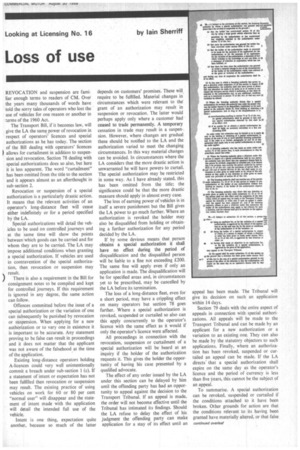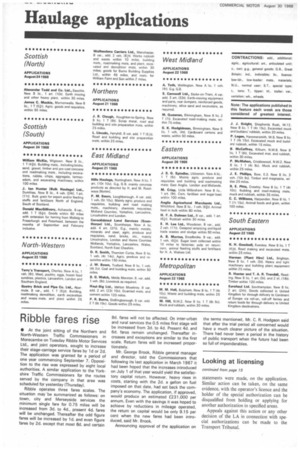Looking at Licensing No. 16
Page 21

Page 22

If you've noticed an error in this article please click here to report it so we can fix it.
Loss of use
by lain Sherriff
REVOCATION and suspension are familiar enough terms to readers of CM. Over the years many thousands of words have told the sorry tales of operators who lost the use of vehicles for one reason or another in terms of the 1960 Act.
The Transport Bill, if it becomes law, will give the LA the same power of revocation in respect of operators' licences and special authorizations as he has today. The section of the Bill dealing with operators' licences allows for curtailment in addition to suspension and revocation. Section 78 dealing with special authorizations does so also, but here it is less apparent. The word "curtailment" has been omitted from the title to the section and it appears almost as an afterthought in sub-section 2.
Revocation or suspension of a special authorization is a particularly drastic action. It means that the relevant activities of an operator's long-distance fleet will cease either indefinitely or for a period specified by the LA.
Special authorizations will detail the vehicles to be used on controlled journeys and at the same time will show the points between which goods can be carried and for whom they are to be carried. The LA may impose additional conditions when granting a special authorization. If vehicles are used in contravention of the special authorization, then revocation or suspension may result.
There is also a requirement in the Bill for consignment notes to be compiled and kept for controlled journeys. If this requirement is ignored in any degree, the same action can follow.
Offences committed before the issue of a special authorization or the variation of one can subsequently be punished by revocation or suspension. When applying for a new authorization or to vary one in existence it is important to be accurate. Any statement proving to be false can result in proceedings and it does not matter that the applicant was not aware of the falsehood at the time of the application.
Existing long-distance operators holding A-licences could very well unintentionally commit a breach under sub-section 1 (c). If a statement of intent or expectation has not been fulfilled then revocation or suspension may result. The existing practice of using vehicles on work for 60 or 80 per cent "normal user" will disappear and the statement of intent made with the application will detail the intended full use of the vehicle.
Intent is one thing, expectation quite another, because so much of the latter
depends on customers' promises. These will require to be fulfilled. Material changes in circumstances which were relevant to the grant of an authorization may result in suspension or revocation. The latter would perhaps apply only where a customer had ceased to trade permanently. A temporary cessation in trade may result in a suspension. However, where changes are gradual these should be notified to the LA and the authorization varied to meet the changing circumstances. In this way material changes can be avoided. In circumstances where the LA considers that the more drastic action is unwarranted he will have powers to curtail. The special authorization may be restricted in some way. As I have already stated, this has been omitted from the title; the significance could be that the more drastic measure should apply in almost every case.
The loss of earning power of vehicles is in itself a severe punishment but the Bill gives the LA power to go much further. Where an authorization is revoked the holder may also be disqualified from holding or obtaining a further authorization for any period decided by the LA.
If by some devious means that person obtains a special authorization it shall have no effect during the period of disqualification and the disqualified person will be liable to a fine not exceeding £200. The same fine will apply even if only an application is made. The disqualification will be for specified areas and, in circumstances yet to be prescribed, may be cancelled by the LA before its termination.
The loss of a long-distance fleet, even for a short period, may have a crippling effect on many operators but section 78 goes further. Where a special authorization is revoked, suspended or curtailed so also can this apply concurrently to the operator's licence with the same effect as it would if only the operator's licence were affected.
All proceedings in connection with the revocation, suspension or curtailment of a special authorization will be heard at an inquiry if the holder of the authorization requests it. This gives the holder the opportunity of having his case presented by a qualified advocate.
The effect of any order issued by the LA under this section can be delayed by him until the offending party has had an opportunity to appeal against the decision to the Transport Tribunal. If an appeal is made, the order will not become effective until the Tribunal has intimated its findings. Should the LA refuse to delay the effect of his judgment the offending party can make application for a stay of its effect until an
appeal has been made. The Tribunal will give its decision on such an application within 14 days.
Section 79 deals with the entire aspect of appeals in connection with special authorizations. All appeals will be made to the Transport Tribunal and can be made by an applicant for a new authorization or a variation to an existing one. They can also be made by the statutory objectors to such applications. Finally, where an authorization has been revoked, suspended or curtailed an appeal can be made. If the LA directs' that a special authorization shall expire on the same day as the operator's licence and the period of currency is less than five years, this cannot be the subject of an appeal.
To summarise. A special authorization can be revoked, suspended or curtailed if the conditions attached to it have been broken. Other grounds for action are that the conditions relevant to its having been granted have materially altered, or that false
statements were made, on the application. Similar action can be taken, on the same evidence, with the operator's licence and the holder of the special authorization can be disqualified from holding or applying for another authorization in specified areas.
Appeals against this action or any other decision of the LA in connection with special authorizations can be made to the Transport Tribunal.




















































































